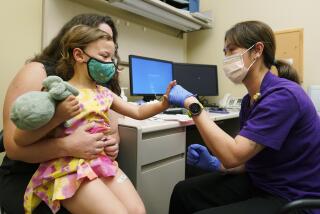Keeping Kids Safe Means Accepting Responsibility
- Share via
Can another Littleton, Colo., experience be prevented? Can youngsters be prevented from killing others and themselves and spared the trauma of attending the funerals of peers? Can students attend school without worrying about being killed or seriously hurt?
The answer is definitely yes.
When a car is not working, there are tools and experts available to fix it. But the driver also needs to realize that the car is not functioning properly, accept his or her role in repairing it and take the time to obtain tools or seek help.
Few adults blame the car engine when it breaks down but many blame other family members for problems, rather than look at what they can do to help. Parents blame the media; teachers and school administrators blame parents; the media blame the school and parents; law enforcement agencies blame parents and schools. Mothers blame fathers; fathers blame mothers.
We will not prevent future tragedies such as Littleton if adults blame someone else. Success will occur when responsible adults accept responsibility.
Parents need to accept that their “car,” or family, is not working properly and obtain or apply the tools to fix it. Some of the most important of these tools are compassion or sympathy, and helping youngsters to deal with anger and stress.
Many parents do not realize the need to teach their youngsters how to show compassion or be sympathetic toward others. In Littleton, the so-called jocks and Trench Coat Mafia youngsters were not sympathetic to each other. Parents and teachers were not sympathetic to the comments of either group, and probably were not sympathetic to the concerns of each other. Did the parents encourage their youngsters to give to the needy, to understand others who were different? Did they accept the negative feelings of their youngsters, to help them release anger and heal?
Children and teenagers need to be taught how to deal with anger. This is difficult if parents have not been taught healthy ways to deal with their own anger. As someone once said, “Children can’t learn until their parents have been taught.” Unfortunately most parents don’t know that they don’t know. They don’t know that they must learn how to deal effectively with their anger and then pass that skill on to their youngsters.
Children and teens live in a much more stressful world today than that of 20 or 30 years ago. Violent cartoons in the morning are followed by other violent television shows later in the day and even more violent news broadcasts at 6 p.m. More youngsters come from single-parent homes and many more come from homes in which both parents work. Kids breakfast while looking at a missing child’s photo on a milk carton and see the picture of a lost child on the back of pizza advertisements that come in the mail.
Parents may not be able to change society but they can become more proactive in teaching their youngsters positive, constructive and practical ways to deal with stress. Here again, many adults fall short because they have trouble coping. Getting the family car running, so we can get to work, takes on greater urgency than getting the family running efficiently. Adults may try to ignore a problem when they don’t know how to fix it, especially when the problem involves relationships.
And then there are what I call “dragons.” Dragons are the hidden factors adults bring with them from childhood that keep them from applying or even looking for the tools to resolve problems. The biggest dragon of all is the tendency to pretend when in pain. Many adults, when young, could not express pain--pain about a parent’s death, a divorce or perhaps frequent moves--so they learned to pretend. They bring this strategy into their adult world. Their child may get Cs in school, but the parents pretend it’s OK. The child gets Ds, and the parents say, well, it could be worse. The youngster runs away from home or comes home drunk and finally the parents are unable to pretend any longer. They seek help. But sometimes it’s too late.
Children usually are powerless to change their families. Many adults, unfortunately, continue to feel powerless to institute healthy changes. I have said many times to an adult, “You aren’t 5 years old anymore; you are 45. You can make a difference in your family.” But for some, it takes months to believe this and to begin to make positive changes.
Just as a car runs most effectively when built and repaired with the proper tools, so will a family run more effectively when the proper tools are used. The challenge isn’t in trying to figure out what those tools are. The challenge is in trying to persuade parents to add new tools to their repertoire, and to get them to deal more effectively with their own dragons, which inhibit their exploration and consistent use of the tools.






